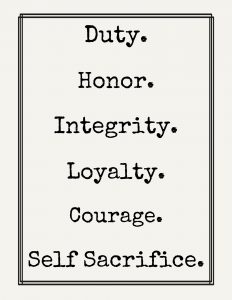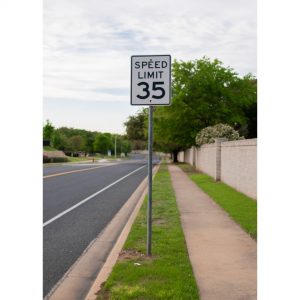For several years, I sat for long hours every day behind one of those battleship gray desks in a windowless, dull, gray office. The pay was enough to take care of the bills, but the job was not anything worth writing home about. I was merely one little cog in a very large piece of machinery. I stayed with it for six years though because I knew that it played a part in a much larger and more important picture.
The Writing on the Wall
Instead of beautiful artwork running along that long gray wall where windows should have been hung, cheaply framed posters with just one eighteen-inch high word blaring at us as if we were almost blind. They yelled at us in a simple, straightforward, no-frills drill instructor tone, “Duty. Honor. Integrity. Loyalty. Courage. Self Sacrifice.” These things had been screamed at us from the first day in the organization, years before, and we were reminded of them regularly for all the years in between.
Yet, despite that, I would routinely observe a line of embarrassed young men and women who had taken an oath to keep those principles, publicly awaiting their punishment for violating them. Everyone stared straight ahead without speaking or being spoken to. One by one they passed those big old posters as they were called to enter the nondescript door at the beginning of the line. One by one, they exited without rank, pay, or sometimes even a job.
who had taken an oath to keep those principles, publicly awaiting their punishment for violating them. Everyone stared straight ahead without speaking or being spoken to. One by one they passed those big old posters as they were called to enter the nondescript door at the beginning of the line. One by one, they exited without rank, pay, or sometimes even a job.
You see, those posters were more than just oversized words on a wall. They were a code of conduct that not only helped us do our job together but were a guide to every word and every action in our lives. Each one of us in that dull gray office was a specialist or leader in various skill sets. None of those titles, specialties, or responsibilities meant more than the character principles on the wall.
As each person who stood in those long lines was about to discover, someone else could be trained or brought in to take care of that specialty or task if necessary, but the principles on the wall were irreplaceable. Our hard work, determination, and specific specialties made us a machine. The words on the wall put the heart and soul into that machine.
The Importance of Differentiating Rules and Principles
Now I know that some of you may have grown up under an iron rod of endless rules and discipline. Some of you may have come from backgrounds where you had none. So let me ask both groups to not confuse rules with principles.
Let me explain: The speed limit on public roads is a rule. It tells us that we cannot exceed a specific limit in a specific area because someone with authority sets that limit. Most, if not all of us have to admit we violate rules in some way far too frequently. Technically, even half a mile per hour over the speed limit is violating the rule. The law says any infraction of the law can bring disciplinary action, and as crazy as it sounds, I’ve known of people getting tickets for being a mere one mile per hour over the speed limit. Believe it or not, I once received a speeding ticket while sitting at a red light laughing and talking with my wife. Just a word of advice, don’t get caught laughing at something someone’s doing if they have the authority to give you a ticket to wipe that grin off your face.
Anyway . . . principles are different from rules. According to Webster’s dictionary, a principle is “a fundamental law, doctrine, code of conduct or fact.” Now I’ve worked for companies that had books of rules that were intended to keep “a tight ship” so they could make a profit or maintain their public image. Sometimes those rules were amoral, meaning there was no true good or bad associated with them. For example, the sign on the wall that says, “Everyone must wash and dry their own coffee cup” is because someone got tired of cleaning up after a lazy person. Saying, “Don’t take the pens, paper, toilet paper, and coffee creamer home” is something different altogether.
Now, sometimes rules can violate principles. The requirement to pay for dues, fees, or insurance that promotes or subsidizes the destruction of innocent human babies is a rule  that violates the principle of the value of human life. You may know of other examples like this. I know of someone who drove more than 30 miles per hour over the speed limit while weaving around traffic and talking on a cell phone for almost 30 minutes, to get a family member to a hospital before they died. That was a clear violation of the rules, and they could have faced severe disciplinary measures, however, they didn’t because those in authority understood that the driver was meeting the higher principle of saving someone’s life.
that violates the principle of the value of human life. You may know of other examples like this. I know of someone who drove more than 30 miles per hour over the speed limit while weaving around traffic and talking on a cell phone for almost 30 minutes, to get a family member to a hospital before they died. That was a clear violation of the rules, and they could have faced severe disciplinary measures, however, they didn’t because those in authority understood that the driver was meeting the higher principle of saving someone’s life.
Don’t misapply this. Rules are necessary. An example of that is the speed limit, which is intended to keep millions of people safe on the roads every year. It would be completely impossible to do that without a speed limit. You and I both know that some of us would think that 100 miles per hour was a perfectly safe speed and was fine so long as we were the only ones to drive that way, especially when we were late for work.
Making rules more important than the principle though creates robots or rebels. You know I’m looking in the mirror and seeing some of you out there. You know who you are. As for myself, I spent enough time in an overseas missionary dormitory school to discover the ditch on both sides of this specific highway.
Suggested Products
The Homeschool Application
Let’s make this practical for your homeschool classroom though. Yes, your children need rules to help them show up on time (your specified time) with their clothes on, teeth brushed, and ready to learn. It’s usually pretty necessary to lay down certain rules like, “No spitballs. No phones. No repetitive 20-minute bathroom breaks. No annoying noise(s).” If you aren’t abiding by those yourself though, you might need a few more rules in your classroom.
The cultural expectation that every classroom has to start at the same time and match the calendar year day for day just like every other school is bogus though. This is a classic misapplication of the rule over the principle or purpose for our children to learn. Just yesterday I discussed this with one of my daughters who had gone with me to help a family member for a short time in the middle of the day.
She had observed the angry, nose-in-the-air looks of an older woman who wanted to make it obvious she was upset that my daughter was not in class at that moment. My daughter couldn’t understand such severe disapproval. I had to explain to her that sometimes people assumed a good education only came from 9 a.m. to 3:30 p.m., including two recesses, study hour, gym, and lunch.
study hour, gym, and lunch.
What the dear old soul with a penchant for drowning on rainy days didn’t know was that my daughter is an exceptional, hard-working, A+ student who regularly starts her own school day almost two hours before her public school peers and often ends hours after them. She also didn’t know my daughter had already done her chores for the day, made a meal, cleaned up the kitchen, and by her choice wanted to help her big sister by babysitting for her lunch hour.
What public school student twice her age has that kind of education, experience, or character? The point is that because my daughter is guided by a few rules set by principles rather than the other way around, she’s learning to keep the most important thing the most important thing.
Hopefully, she’ll remember her lesson for that impromptu class, “It’s fine if you put a few rules out on the deck of your cruise ship to keep passengers from sitting on the rails, but don’t steer the ship with them.”
Properly Prioritize Rules and Principles
The long and short of this is to keep rules and principles in their correct place. Think about what you’ve put in place in your homeschool classroom and why. Be honest, be humble, and be willing to listen to reason rather than accept complaints, politics, or popular whims. Do what’s right and effective to teach your children.
And if you bump into someone who gets a sunburn under their nose every time you do something different than the rest of the Lemmings, try your best to respond kindly and not to pray for intervening lamp posts or garbage bins while they’re rolling their eyes. Remember that Kindness and Wisdom are principles to live by, not rules we can violate when we feel like it.
More About the Author:
 Gabriel is a former homeschooled missionary kid and homeschooling father who adores his wife, children, and grandchildren. He is currently rebuilding a 130-year-old homestead, writing a historical fiction book on character for young people, and mentoring young men. He is a former U.S. Marine Corps Combat Correspondent, Army National Guard Photographer, and U.S. Army Deputy Public Affairs representative and holds a Bachelor of Arts in Communication. He lived in Central America during Junior High and served on military short and long-term assignments across the U.S. and in half a dozen countries, including Iraq during his military career. Besides his deep faith and his family, his passion is writing and developing young men into capable steward leaders.
Gabriel is a former homeschooled missionary kid and homeschooling father who adores his wife, children, and grandchildren. He is currently rebuilding a 130-year-old homestead, writing a historical fiction book on character for young people, and mentoring young men. He is a former U.S. Marine Corps Combat Correspondent, Army National Guard Photographer, and U.S. Army Deputy Public Affairs representative and holds a Bachelor of Arts in Communication. He lived in Central America during Junior High and served on military short and long-term assignments across the U.S. and in half a dozen countries, including Iraq during his military career. Besides his deep faith and his family, his passion is writing and developing young men into capable steward leaders.
Latest Posts

As homeschooling continues to grow in popularity, more parents are taking on the challenge of providing a comprehensive education that not only meets academic standards but also prepares their…
Read more >
June has come and gone, and summer is in full swing! Whether you're traveling this summer or staying close to home, we hope you're enjoying this time with your family. We wanted this month's…
Read more >
Summer is an all-around favorite season for most people. In the U.S., it’s even more exciting for many of us since we get to celebrate Independence Day! The Fourth of July is a wonderful…
Read more >


